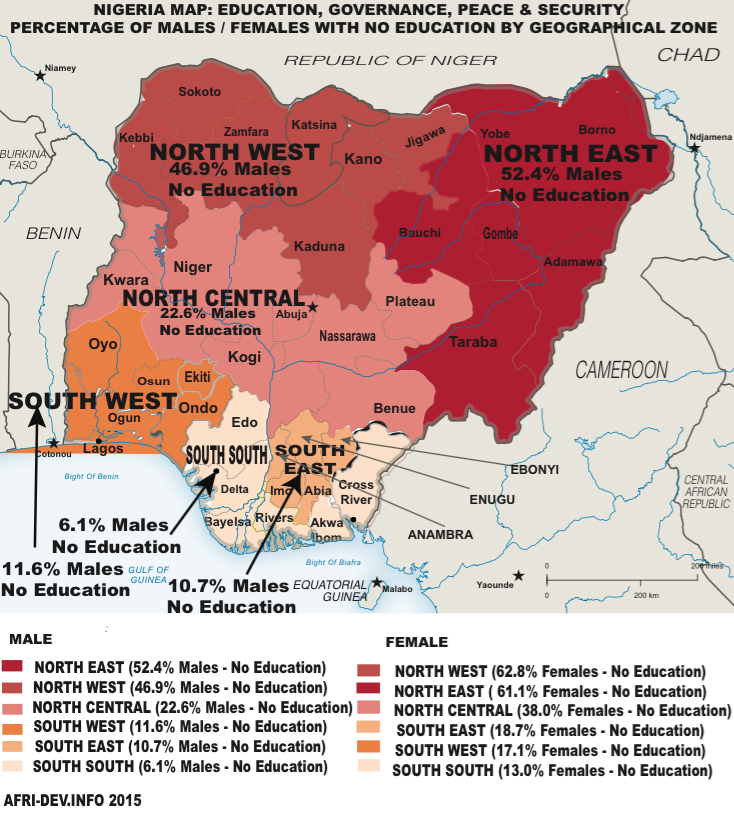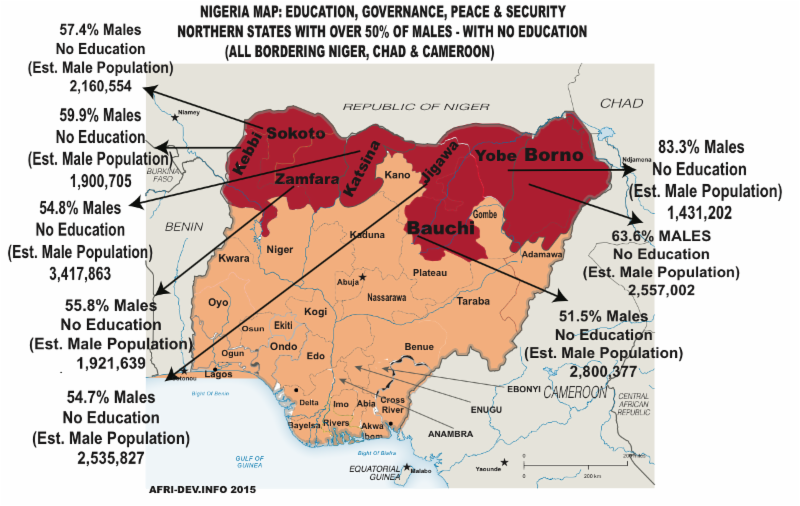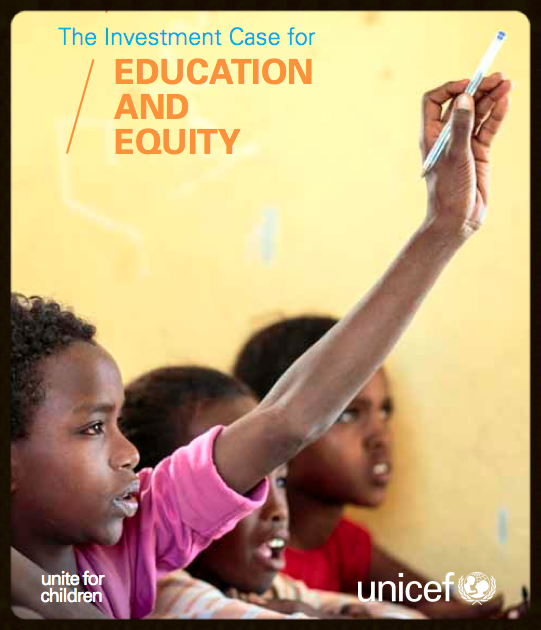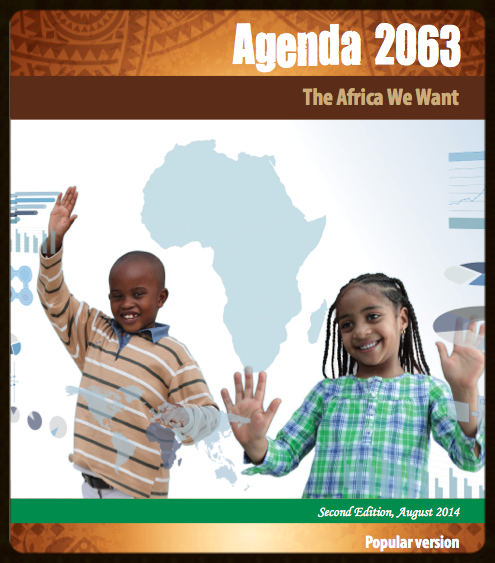
Addressing Linkages Between Education, Governance, Peace & Security in North East (& North West) Nigeria – Affected By Boko Haram

 Summary Findings & HighLights of New Scorecard & Factsheet
Summary Findings & HighLights of New Scorecard & Factsheet
- Human And Social Development Data Sheds Light on Boko Haram Anti-Education Stance – In North East Nigeria Most Affected By The Insurgency – 52.4% Of All Males Over Age Of 6 Have Not Had Access To Any Form Of Education
- Boko Haram’s Exponential Growth May Owe More To Its Skillful Exploitation Of Weak Governance, Poor Human Development & Socio-Economic Conditions Rather Than ‘Military Might’
- In Yobe And Borno States (2 Of The States Under States Of Emergency Till Recently) 83.3% And 63.6% Of All Males Over The Age Of 6 Have Not Had Access To Any Form Of Education.
- Data Also Indicates North West Nigeria Is Susceptible To Extremists Message And Recruitment – In 5 North West States The Majority Of Males Over 6 Have Not Had Access To Any Type Of Education: Kebbi 59.9%; Sokoto 57.4%; Zamfara 55.8%; Katsina 54.8% And Jigawa 54.7%.
- Instability Could Spread Rapidly Across National Borders – In Almost Every North Eastern And North Western Nigerian State That Borders Niger, Chad, And Part Of Cameroon – A Clear Majority (Over 50%) Of Males Over 6 Years Old Have Not Had Access To Any Form Of Education
– Yobe 83% (North East), Borno 63.6% (North East), Kebbi 59.9% (North West), Sokoto 57.4% (North West) , Zamfara 55.8% (North West) , Katsina 54.8% (North West) , Jigawa 54.7% (North West)
- No Exclusive Military Solution is Possible. Improved Policy And Massive Investment In Education And Youth Development Must Be Factored Into The Peace And Security Architecture For North East, North West Nigeria And ECOWAS Sub-Region.
- ECOWAS Finance And Development Ministers Need To Meet Urgently With Education And Youth Development Ministers And Governors Of North East & North West Nigeria On Improved Policy And Investment For Education & Youth Development.
|
Extracts From Public Policy & Media Brief on Findings of Scorecard & Factsheet
North East, North West State’s And Federal Government Not Acting On Evidence From Socio-Economic Data And Indicators
Whatever the specific origins of the group Ahlussunna lid-Da’wa wal Jihad (more un-popularly known as Boko Haram) socio-economic and human development data indicate its rise to prominence and growth cannot be fully understood unless examined in the context of weak governance, poor socio-economic conditions and underdevelopment it has brutally and skillfully exploited – to advance its extremist goals; and in particular the inter-linkages between Education, Youth Development, Governance, Peace and Security. In North East Nigeria most affected by Boko Haram an astonishing majority of 52% of all males over the age of 6 years have not had access to any form of education – leading to un-employability, impoverishment, and destitution on a mass scale. Estimated number of males in North East States is 11.4 million. (See full scorecard / & online version of maps)In Yobe and Borno states (2 of the states until recently under state of emergency) an unbelievable 83.3% and 63.6% of all males over the age of 6 years – have not had access to any form of education.
While North East Nigeria has suffered the most insecurity, it is not the only geo political zone susceptible to the message of extremism.North West Nigeria is also highly at risk, with 46.9% of males having no education. In four out of 7 of the North West states, a majority of well over 50% of males aged above 6 years have also had no access to any education.
Significantly, in almost every North East and North West Nigerian state that borders Niger Republic, Chad, and part of Cameroon – the percentage of males over 6 years old that have not had access to any education are in the clear majority – ranging from Yobe 83% (North East), Borno 63.6% (North East), Kebbi 59.9% (North West), Sokoto 57.4% (North West), Zamfara 55.8% (North West), Katsina 54.8% (North West), Jigawa 54.7% (North West) – along with Bauchi 51.5 (North East) – a bit further inland. Very significantly, the percentages of uneducated males across these 8 states translate into roughly half of a combined male population of 18.7 million – creating a large pool of penury, misery, destitution, vulnerability, and potential sympathizers for Boko Haram. Clearly not every uneducated male in North East and North West Nigeria are members of, or even sympathizers of Boko Haram. But if just 10%, or even 1% of the above numbers empathize with, or are vulnerable to Boko Haram’s brutal indoctrination – this would translate into roughly tens or hundreds of thousands. Exclusion and marginalization from modern society on this scale (in the face of poor governance and opulent ‘fat cat’ officials) translates into a large pool of resentment and potential sympathizers for Boko Haram. The Sociology Of Boko Haram
Sociologists have long established that – When large groups of uneducated, unemployed / unemployable, socially excluded, marginalized (and by extension resentful) young men, cluster in tens or hundreds of thousands in vast geographical areas where there is little or no governance presence (few schools, no social amenities, no jobs etc.) – they are more likely to behave unlawfully, be less governable and more vulnerable to forming or joining groups or gangs prone to anti social, criminal and, or extremist behavior. It does not take much imagination to see how the introduction of extremists like Boko Haram that (fill the governance gap) provide arms, some training, brutal indoctrination – facilitate a crude reward system of looting villages and towns, and mass abductions of young girls and women – can quickly translate into a significant anti-social movement – leading to mass insecurity, and the displacement of millions of citizens – and therein lies the problem. It is even questionable whether uneducated / non-literate, indoctrinated males consumed by looting and abduction of girls have any real understanding of religion? Evidently it is easier to be against education, when or where the majority have been completely excluded from the educational and human development process; and by extension it is easier to attack schools – in places where schoolgirls and schoolboys are a minority. Exploiting the hysteria amongst the political elite, fake Boko Haram groups have also apparently emerged to negotiate with and extort resources in exchange for fake ceasefires; with the government seemingly falling for at least one hoax promise to release the Chibok schoolgirls. As if the real Boko Haram is not bad enough, there is now apparently competition from ‘419’ Boko Haram. If the consequences where not so serious, it might actually be funny. But this is no laughing matter. If (as is very likely) more atrocities are committed by Boko Haram in its desperation to demonstrate it cannot be defeated, there will be little patience for ‘sociology’. But the authorities will have to come back to this. Even if the estimated 6,000 to 10,000 core are all captured – what happens next ? Both to them, their sympathizers, and the poor conditions that created the sympathizers ? A Multisectoral Human And Social Development Strategy For Peace And Security
The evidence that education and youth development are drivers of economic growth is well established. It appears incontrovertible that they are just as important for governance, peace and security. As the insecurity spreads – health, human, social and economic development are dragged backwards in the North East – education is now a high risk activity; maternal and child mortality are on the rise; vaccinations are not being given to children; treatment and prevention of HIV, TB and Malaria have suffered; Neglected Tropical Diseases will be further neglected; gender equality, girls and women’s rights, health and development are receiving a battering; clean drinking water is a rarity, and malnutrition and stunting are growing. If North East Nigeria were a country, it would not be far from the bottom of the global human development index. Going forward, improved policy and massive investment in education, youth and population based development must be factored into the Peace and Security Architecture for Nigeria and the ECOWAS sub region – and the lesson must extend to the rest of Africa, if not globally. By 2030 – within 15 years – Nigeria alone is expected to add an estimated 92 million youth to its population – roughly equivalent to the current population of Egypt or Ethiopia. The planning for their schools, teachers and development training should have commenced already (to avoid possibility of even wider insecurity in the near future). Such population growth – driven by poor family planning, very high fertility rates – and underpinned by underage/child /forced ‘marriages’, multiple ‘wives’ and gender inequality – raises real possibility of a demographically driven catastrophe. At the current time, Nigeria, Chad and Niger Republic are amongst a group of countries with 30% or more of primary school children out of school. In Nigeria this translates to an estimated 8.7 million children. Sustainable peace in North East, North West Nigeria and bordering countries will require long term investment of tens of millions of dollars – in schools and colleges for boy and girl children; adult education and vocational training for millions of men and women – overall population and social development – and crucially the re-orientation of many combatants. ECOWAS Finance and Development Ministers must meet urgently with Education and Youth Development Ministers – on improved policy and investment for all of North East, North West Nigeria and bordering countries – inclusive of protection of schools; and girls / women from gender based violence. Improved and better targeted domestic investment should be supported by the African Development Bank and similar institutions. In particular, Universal Primary Education, International Goals on Youth Development and Education – from the International Conference on Population & Development (ICPD) Beyond 2014, and Post 2015 Sustainable Development Goals – require urgent financing in North East, North West Nigeria and bordering countries – inclusive of gender equality. |
|
Statement Ends: For further information contact kindly contact us through email: media[a]afri-dev.net
|
|
Nigeria, Niger, Chad / West Africa
Education Profiles More Instability In The Near Future?
Selected Countries With More Than 0.5 Million Out-of-School Children (Primary School Age). 2012 or Latest Available Year
 UNESCO Institute for Statistics 2014 UNESCO Institute for Statistics 2014Percentage – Out-of-School Children of Primary School Age (Including Nigeria, Niger Republic & Chad)
UNESCO Institute for Statistics 2014
|

Victims of Boko Haram Anti-Education & Anti-Gender Equality Terror – Over 300 Days in Captivity
________________________

President Goodluck Jonathan  Senate President David Mark & Speaker of House Aminu Tambuwal
Senate President David Mark & Speaker of House Aminu Tambuwal  Minister of Education – Ibrahim Shekarau _________________________ Governors of Borno, Yobe & Adamawa States With Direct Responsibility for Education & Youth Development In Their States
Minister of Education – Ibrahim Shekarau _________________________ Governors of Borno, Yobe & Adamawa States With Direct Responsibility for Education & Youth Development In Their States  Governor Borno State – Kashim Shettima
Governor Borno State – Kashim Shettima  Governor Yobe State -Ibrahim Geidam
Governor Yobe State -Ibrahim Geidam  Governor Adamawa State – Bala Ngilari
Governor Adamawa State – Bala Ngilari





- Media: For further information please contact Email: media[at]afri-dev.net
- To find out more about publications please contact email: publications[at]afri-dev.info
- For partnerships, support or general information please contact email : contactus[at]afri-dev.info



